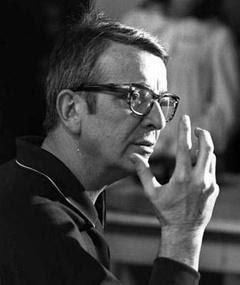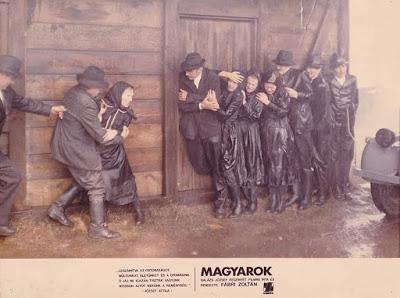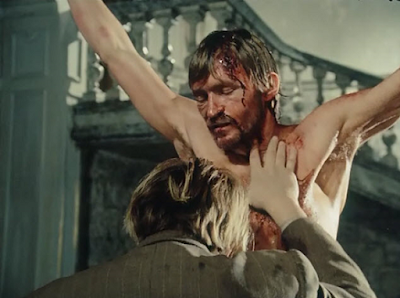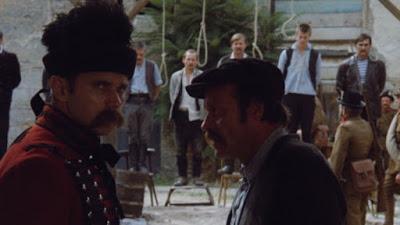
Zoltan Fabri, 1917-94 (Courtesy: MUBI)
Transcript of the interview published in the daily newspaper The Telegraph, (Kolkata, India) on 15 August 1982
Zoltan Fabri is not an unknown name in India. His films have been widely shown in screenings in India, courtesy NFDC, and he holds the distinction of winning two awards at the Delhi International Film Festival of India (IFFI). In 1979, Hungarians won the Golden Peacock for the Best Film and in 1981 his film Balint Fabian meets God was awarded the Silver Peacock for the Best Actor. Fabri is one of three great Hungarian filmmakers—Miklos Jancso and Istvan Szabo completing the trio. Jugu Abraham, who interviewed him in Hungary, found him to be ‘a lovely old man’ with impeccable manners and forthright views. The interview:
Q. In India, we see a lot of your films but we hardly know anything of the person behind the camera. I would like to ask you something of your personal life. Your films have shown the protagonists playing very tragic and sombre roles, full of strife and sadness, in Hungary of the Second World War and before. Was your personal life as tragic, as difficult and as sombre as the heroes of your films?
A. My parents were relatively poor. My father worked in a bank as a clerk. In the summer, I lived with the peasants. And the reason peasants recur in my films is that I learned very much about their lifestyles. I went to school in town. I went to the College of Fine Arts. I wanted to be a painter. At that time film was not taught in college. I was born a weak child. I had problems with my tonsils which were removed, and I was beset by recurring illness of a weak heart.
Q. How much of your life was affected by the World Wars?
A.I was born during the First World War I have very few memories of that World War. We lived in misery. I was living in a big house with lots of people living in it. During the Second World War, I was in college, on a scholarship. In college, I would win at poetry recitals and wonder what I would do later in life. I had to choose between painting and directing plays. In my sixth form, I put up Julius Caesar and played Antony. But am I boring you?
Q. No, please continue.
A. So I joined the School of Fine Arts. At the end of the third year my father tried to find a job for me. He found me a job as a drawing teacher in one of the plush schools. But I decided to leave college.
One afternoon, I went to my father, who was shaving, and told him I am going to quit the School of Fine Arts and I intended to join the Theatre College. My father chased me like a mad man with a razor in his hand for 10 minutes. But after a lot of pleading, he agreed to let me try out theatre studies for a year at college. At the end of the year, my father went to the school to find out how I was doing. I was allowed to stay on. I need not elaborate why.
I finished the school in 3 years, making it clear that I did not want to be an actor but a director. I wrote scripts for an Ibsen play and even made sets for it. And the play was a great success. The production went through all the Budapest theatres in one year.
Two days after getting my degree, I got a letter from the National Theatre that I should go and discuss my contract. In my first play at the National Theatre, there were actors who had been my teachers at the college.
Q. Was your private life greatly affected during the Second World War?
A. In 1943, I was taken prisoner till 1945. I had no contact with my family at that time. I was single then. I wasn’t married. I returned to find Budapest totally bombed. As I approached my house, I found all our neighbouring houses were bombed but my parents’ flat had survived.I found them safe. It was a horrible memory to reconstruct things.I went back to theater and worked in all Budapest theatres as a director, as a set director and sometimes as an actor.
Q. Today if you were to choose between film and theater which would you choose?
A. I would choose film.
Q. Which films have been close to your personal life?
A. Twenty hours perhaps was one. Unfinished Sentence was almost as if it was written for me. I didn’t come from an aristocratic family but what happens in the family almost happened to me.
Q. Do you feel the characters in your films are reflections of your trials?
A. in my films, I am speaking about people who somehow have to get to the battlefield of history and they have to pass a trial of human conduct, a probe, a search.
Q. What do you feel about your black and white films like Merry Go Round visually?
A. In spite of the fact that I never became a painter, one cannot totally bring oneself to reconcile to making films in color after making films in black and white.
Q. Why is it that you delve in the past? Doesn’t speculation of the recent past of your country or its future interest you? Science fiction, for instance.
A. I do not think I am suitable for science fiction or the like but I do think of the future. In Unfinished Sentence, I spoke about the future, in a way.The future became the past in the film. The past and the present are in a very close relationship. You cannot for instance understand the present day Hungary without understanding the past. Consequently, when I make a film on the past, I want to communicate to the present viewer.

Q. Would you like to comment on the fact that you made Balint Fabian meets God after you made Hungarians? Hungarians chronologically should have come after Balint Fabian meets God.
A. It wasn’t my decision. Studios who wanted me to make Hungarians knew very well I wanted to make a film of Balint Fabian. I told them that chronologically it should be Balint Fabian meets God that should come first. But they considered Hungarians to have a more universal message. So they said “How do you know if you will ever get to finish Balint Fabian? So why not make Hungarians first? “ They were right in saying Hungarians contained the fate of a nation in a delicate and miserable situation, with a limited spectrum of thought and communication. At the same time, the characters in the film thought and expressed in a very universal way without being conscious of it.

A defining moment in The Fifth Seal; filming
"the most important question of our life" for Fabri
Q. Why did you pick up the book The Fifth Seal for a film?
A. I picked it up in 1965. But there were cultural-political reasons, which were against my plans to film it. First, they said it was an existentialist work.I said that was not true at all. But they won. I could only make it in 1975-76. It was a great message for me to put on screen. First, I was challenged by the stage-like story—it is almost anti-film. The second part was more appropriate for cinema.
What basically attracted me were the four or five petty bourgeoisie characters talking of survival and the extent one can go to survive. As a counterpoint, there is a Fascist who is educating the younger person to emulate the other persons to achieve his own aims. The third part is how neither of the theories will work—neither of the petty bourgeoisie nor of the Fascist.
Q. What made you pick up the book? Did you like what was said in the story?
A. This thesis anti-thesis leading to synthesis formula I found most intriguing. And the most important question of our life is there.
Q. Are you religious?
A. I cannot make dogmatic religion acceptable for myself in spite of the fact that I went to a religious school when I was young. I believe in the moral content of religion; for me it is very significant to assess a person’s moral values. At the same time I am not bothered about a person’s religion or whether he practices it.Morality is most important.

Crucial scene from Balint Fabian Meets God
Q. In India, after viewing your films, we get an idea that you are ambiguous in your treatment of religion. What is your personal attitude towards religion?
A. In Balint Fabian meets God, it is true that Balint Fabian’s relationship with religion is ambiguous. You can see it as self-sacrifice of a person deeply in love with his wife to meet God. Isn’t that true?
Q. Why are Russians kept out of you films?
A. I have no idea.
Q. Has any filmmaker influenced you other than Marcel Carne and Orson Welles?
A. The French directors, of course but Orson Welles influenced me most. Welles could not surpass what he did at 25—Citizen Kane—which can be appreciated and enjoyed even today.
Q. Children hardly occupy any place in your films. If they come in, they are only fringe characters. Is there any reason for it?
A. Basically, I don’t know why.
Q. Why have you specialized in tragedy? Is it something to do with your theater experience?
A. Most probably because my view of life attracts me more to tragedy than to comedy. My mentality of daily life style is serious, not comic. However, in Two Half Times in Hell and in The Tot Family, I approach the tragicomic border.
Q. You have worked with Georgy Vukan as the music composer for the last five or six films. Would you like to tell us something about this man who has intrigued me with his music?
A. It is a personal relationship I have with him. He is an artist whom I like. He was a discovery of mine, you can say. I used his music when he was 21 years old. Now he is 30 or about that age.
Q. What do you feel about Boys on Paul Street made for Hollywood?
A. I liked the message of the book. It was not my best film. It was a “noble” film.
Q. What then was your best film?
A. You can pick between Prof Hannibal, Twenty Hours, The Fifth Seal and Hungarians.
P.S. The author's detailed review of Zoltan Fabri's film The Fifth Seal was published earlier on this blog. The Fifth Seal is one of the author's top 100 films ever made. (To access the review, click on the name of the film in this post-script.) The author, who was a staff film critic of the Hindustan Times group of publications in New Delhi, was invited to Budapest to interview Zoltan Fabri and Miklos Jancso in 1982. During the interactions, Fabri expressed his disappointment that US director John Huston's film Victory, in its credits, did not mention Fabri's earlier film Two Half Times In Hell, which was evidently a major source for the US director, a film personality who Fabri always admired.

